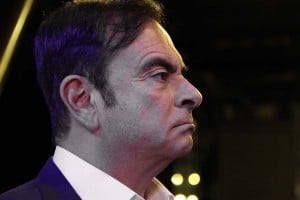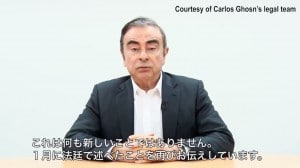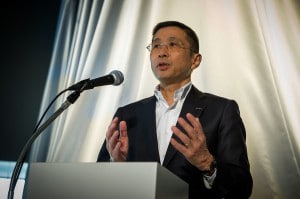
Carlos Ghosn, the former Renault-Nissan Alliance chief, spoke out for the first time since his escape from Japan.
This story has been updated.
Meeting with reporters for the first time since his unexpected arrest in November 2018 – and his bold escape from Japan 13 months later, former Renault-Nissan Alliance boss Carlos Ghosn laid into both Japanese prosecutors and the second-largest of that country’s automakers, while forcefully proclaiming his innocence on a variety of financial corruption charges.
Ghosn was, in his words, “brutally taken” from his familiar world after being dragged off his corporate jet in November 2018, shortly after it landed in Tokyo. Snared by what Nissan’s CEO subsequently described as an internal inquiry that allegedly found Ghosn had hidden millions in income. He subsequently spent much of the next four months in a tiny, unheated cell and, even after being released on about $13 million in bail was subject to severe restrictions that, among other things, barred him from seeing his wife or son.
(Year begins with big mystery: how did Ghosn escape Japan?)
Ghosn unexpectedly fled Japan just before New Year’s Day, making his way to Turkey and then on to Lebanon, his family’s ancestral home. There, protected from extradition by Lebanese law, the one-time industry leader spoke out as he had promised to do since his arrest. And many of his comments focused on what he claimed was misconduct by both Japanese prosecutors and senior Nissan officials.
“The collusion between Nissan and the prosecutor is everywhere,” said the 66-year-old Ghosn as he stood before more than 100 reporters in the sort of dark suit and red tie he routinely wore during news conferences as head of the global automotive alliance.
Ghosn accused prosecutors of violating 10 different Japanese laws during their investigation and imprisonment of him.
During the few occasions where Ghosn had issued a public statement after his arrest and while still in Japan, he accused Nissan’s Japanese management of engaging in a “coup.” He previously suggested they were hoping to block his plan to formally combine Nissan with Renault, the French automaker that launched a $6 billion bailout in 1999 that prevented the Japanese company from going bankrupt.
During Wednesday’s news conference, Ghosn added another possible explaining, saying Japanese managers were motivated by concerns about Nissan’s declining fortunes. The company has suffered a sharp decline in sales and earnings over the past several years, in 2019 ordering the elimination of over 12,000 jobs worldwide while laying out plans to reduce its global capacity by 10 percent.
(Nissan to get hit with $22M fine for underreporting Ghosn’s compensation)
As critical as Ghosn was of the automaker, he laid out an equally harsh attack on Japanese prosecutors and the Japanese justice system, in general.
“There is no democratic country I know where you go to jail for these kinds of accusations, even if they were right,” he said.
While prosecutors eventually laid out a series of charges and Ghosn has now been accused of diverting corporate funds for personal use, he was originally charged only with under-reporting his income. Numerous legal experts have spoken out on that, noting that such concerns would normally be handled by a corporation internally in most countries or, at worst, trigger a civil lawsuit.

Ghosn was repeatedly prevented from speaking out while in Japan, though he did issue one edited statement on tape.
In Ghosn’s case, he was sequestered in a tiny cell in the Tokyo Detention Center, prosecutors routinely extending his stay by adding new charges each time he was set to be released on bail. Even after a judge did release Ghosn, he was sent back to prison for several more weeks when still more charges were laid out.
The case generated global concerns about the Japanese justice system, critics questioning how it could achieve a conviction rate of over 90 percent – and the harsh conditions under which the accused were sequestered. Indeed, Ghosn’s case followed another involving a foreigner, Julie Hamp, the head of global public relations for Toyota, who had been accused of bringing in drugs to Japan. She was held without bail for an extended period, kept in a cell in which the lights were never turned off and prisoners could not refer to one another by name.
In an ironic twist, Hiroto Saikawa, the man who replaced Ghosn as Nissan CEO and subsequently ordered the company’s internal corruption probe, was subsequently caught up in his own net. He was found to have under-reported his own income. After apologizing, Saikawa was allowed to resign from Nissan and reimburse the company, but he faced no prison time.
“I have not experienced a moment of freedom since Nov. 19, 2018,” Ghosn told reporters on Wednesday. “It is impossible to express the depth of the aggravation and my profound appreciation once again to be able to be reunited with my family and loved ones.”
The executive had been out on bail for months but was subject to close scrutiny and limited not only in his access to the Internet but to whom he could see as he prepared for a trial that kept getting pushed back.
Ghosn would not discuss the details of his escape from Japan but did acknowledge that the choice to flee, “was the most difficult decision of my life.”
But echoing an earlier statement he issued once in Lebanon, he insisted, “I did not escape justice. I fled injustice and political persecution. I was left with no other choice but to protect myself and my family.”
The Tokyo prosecutors’ office was quick to dispute most of Ghosn’s allegations, issuing a statement just after his nearly 2.5-hour news conference ended.
“Defendant Ghosn’s allegations completely ignore his own conduct, and his one-sided criticism of the Japanese criminal justice system is totally unacceptable,” the office said in the statement.
In fact, his family could face their own legal headaches. Japanese authorities have now issued a warrant for wife Carol Ghosn’s arrest, alleging she lied during a hearing last April. Meanwhile, news reports, including one by the Wall Street Journal, have suggested Ghosn’s son was involved in an investment fund that might have benefited from funds the former executive diverted through contacts in the Mideast.
That apparently did not come as a surprise to Ghosn. During his news conference he referred to comments a prosecutor made while he was still in custody in Japan.
“It will be over if you just confess,” Ghosn claimed he was told. “If you don’t confess, not only are we going to go after you, we are going to go after your family.”
For his part, Ghosn appears to be able to avoid the reach of the Japanese legal system, at least as long as he remains in Lebanon which bars extradition of its citizens. He also holds passports from Brazil, where he was born, and from France, where he has worked for decades. But it is unclear if he could leave his current base without the risk of a new arrest.
How Ghosn got out of Japan is likely to continue be debated. Early reports suggested he might have been smuggled out of his Tokyo home in a box and then taken to an airport outside Tokyo for the trip out of the country.
Japanese authorities have now indicated they have video from a surveillance camera showing Ghosn leaving his house as he began his escape. Meanwhile, Turkish jet firm MNG on January 3rd said that a rogue employee falsified records and then arranged for flights to get Ghosn from Japan to Turkey and then transfer to Lebanon. The matter has been referred to Turkish prosecutors.
(One year after arrest, Carlos Ghosn fires back)


